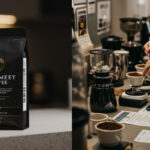
How to Read Coffee Labels: A Guide to Making Informed Choices
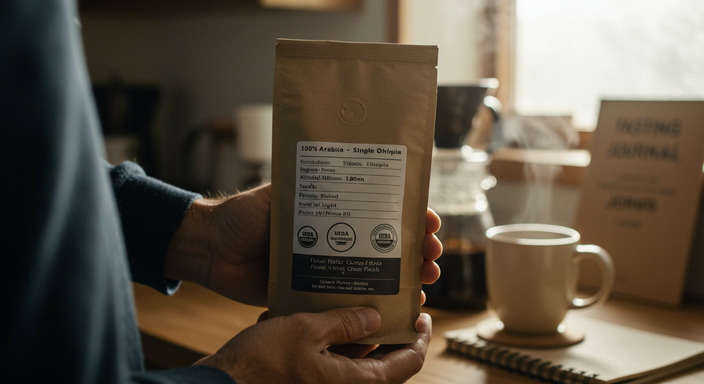
Table of Contents
ToggleWhy Coffee Labels Matter
When you pick up a bag of coffee, the label is more than just decorative packaging—it’s a window into the story behind your brew. Understanding coffee labels can help you make informed choices that align with your values, whether you care about quality, sustainability, or ethical practices. Let’s dive into why these labels are so important and what they can tell you.
Understanding the Importance of Labels
Coffee labels are like a roadmap, guiding you through the origins, processing methods, and certifications of the beans inside. They help you decipher the quality of the coffee, the environmental impact of its production, and the fairness of the labor practices involved. Without understanding labels, you might miss out on important details that make a difference in both your cup and the world.
How Labels Reflect Quality
Quality isn’t just about taste—it’s about the care and attention that goes into growing, harvesting, and roasting the beans. Labels often indicate whether the coffee is single-origin (coming from one specific region) or a blend, as well as the roast level (light, medium, or dark). They may also highlight special attributes, such as shade-grown or high-altitude beans, which often signal superior flavor profiles.
Sustainability Through Labels
If you’re passionate about protecting the planet, coffee labels can help you choose brands that prioritize sustainability. Look for certifications like:
- Organic: Ensures the coffee is grown without synthetic pesticides or fertilizers.
- Rainforest Alliance: Indicates eco-friendly farming practices that conserve biodiversity.
- Bird-Friendly: Certifies that the coffee is shade-grown, protecting bird habitats.
These labels show that the coffee is produced in harmony with the environment, reducing its ecological footprint.
Ethics in Every Sip
Labels also shed light on the human side of coffee production. Certifications like Fair Trade and Direct Trade ensure that farmers are paid fairly and work under safe conditions. By choosing ethically labeled coffee, you’re supporting a system that values people as much as profits.
Decoding Common Coffee Certifications
Organic Certification: What It Means and Why It Matters
When you see the word organic on a coffee label, it’s more than just a buzzword—it’s a promise. Organic coffee is grown without synthetic pesticides, herbicides, or fertilizers, which means it’s better for both your health and the planet. Farmers rely on natural methods like composting and crop rotation to keep the soil rich and productive.
Choosing organic coffee supports sustainable farming practices that protect ecosystems, reduce pollution, and promote biodiversity. Plus, organic coffee often tastes richer because it’s grown in nutrient-dense soil. By opting for organic, you’re not just enjoying a cup of coffee—you’re contributing to a healthier environment and supporting farmers who prioritize the earth’s well-being.
Fair Trade: Ensuring Ethical Treatment and Fair Wages
Fair Trade certification is all about equity and fairness in the coffee industry. This label ensures that farmers are paid fair wages for their labor, allowing them to invest in their communities and improve their quality of life. Fair Trade also prohibits exploitative practices like child labor and promotes safe working conditions.
When you buy Fair Trade coffee, you’re helping to create a more just global economy. It’s a way to ensure that the people who grow your coffee are treated with respect and dignity. This certification also encourages sustainable farming practices, making it a win-win for both producers and consumers.
Rainforest Alliance: Promoting Environmental and Social Responsibility
The Rainforest Alliance certification focuses on environmental and social responsibility. Coffee with this label comes from farms that prioritize conservation, protect wildlife habitats, and reduce their environmental footprint. Farmers are trained in sustainable practices that conserve water, prevent deforestation, and improve soil health.
Socially, this certification also ensures that workers have access to education, healthcare, and fair wages. By choosing Rainforest Alliance-certified coffee, you’re supporting efforts to combat climate change and protect the planet’s precious ecosystems. It’s a choice that aligns with a commitment to a greener, more equitable world.
| Certification | Key Focus | Benefits |
|---|---|---|
| Organic | Natural farming methods | Healthier for consumers and the environment |
| Fair Trade | Fair wages and ethical treatment | Supports farmer communities and fair labor practices |
| Rainforest Alliance | Environmental and social responsibility | Protects ecosystems and promotes sustainable farming |
Ingredients and Additives to Look For
When reading coffee labels, understanding the ingredients and additives is crucial to making informed, health-conscious, and eco-friendly choices. Coffee, in its purest form, is a simple beverage made from roasted coffee beans. However, some products may include additional ingredients or undergo processes that can affect both your health and the environment. Let’s break down what to look for and what to avoid.
Identifying Natural vs. Artificial Ingredients
Natural ingredients are derived directly from plants or other natural sources, while artificial ingredients are chemically synthesized. For coffee, natural means it’s made from 100% coffee beans without added flavors or preservatives. Look for labels that explicitly state “100% Arabica” or “Single Origin,” as these are often indicators of pure, unaltered coffee.
- What to Look For: “100% Arabica,” “Single Origin,” “Organic Certified,” “No Artificial Flavors.”
- What to Avoid: “Flavored Coffee,” “Artificial Flavors,” “Additives Included.”
Avoiding Harmful Chemicals and Preservatives
Conventionally grown coffee often involves the use of synthetic pesticides and fertilizers, which can leave residues on the beans. Additionally, some flavored or processed coffees may contain harmful chemicals, such as artificial sweeteners, preservatives, or synthetic flavorings. Opting for organic coffee ensures that the beans are grown without synthetic chemicals, promoting both your health and the health of the environment.
Here are some key points to consider:
- Organic Certification: Look for labels like “USDA Organic” or “Fair Trade Certified,” which guarantee the absence of harmful chemicals and support sustainable farming practices.
- Flavored Coffee: Be cautious with flavored varieties, as they may contain artificial additives. Choose products that use natural flavorings, such as spices or essential oils.
- Decaffeinated Coffee: Some decaf processes use chemicals like methylene chloride. Opt for brands that use the Swiss Water Process or CO2 method, which are chemical-free.
Roast Levels and Brewing Recommendations
Understanding Roast Levels
Coffee roasts are typically categorized into three main levels: light, medium, and dark. Each roast level brings out unique flavors and characteristics in the beans, making them suitable for different brewing methods and personal preferences.
- Light Roast: Light brown in color, these beans retain more of their original flavor and acidity. They often have a bright, fruity, or floral profile.
- Medium Roast: A balanced roast with a richer flavor and slightly less acidity. These beans are versatile and often have notes of caramel or nuts.
- Dark Roast: Dark brown or almost black, these beans have a bold, smoky, or bitter flavor with minimal acidity. They are often associated with traditional coffeehouse blends.
Matching Roasts to Brewing Methods
Choosing the right roast for your brewing method can enhance your coffee experience. Here’s a quick guide to help you pair roasts with popular brewing techniques:
| Roast Level | Recommended Brewing Methods |
|---|---|
| Light Roast | Pour-over, Chemex, AeroPress |
| Medium Roast | Drip coffee, French press, Cold brew |
| Dark Roast | Espresso, Moka pot, Turkish coffee |
Why Roast Level Matters
The roast level not only affects the flavor but also the caffeine content and body of your coffee. Light roasts tend to have slightly more caffeine and a lighter body, while dark roasts offer a fuller body and a more intense flavor. Medium roasts strike a balance, making them a great starting point for those new to specialty coffee.
Sustainability and Ethical Sourcing
The Environmental Impact of Coffee Production
Coffee production, while a beloved global industry, has a significant impact on the environment. From deforestation to water usage, the process of growing and harvesting coffee beans can strain natural resources. Traditional farming methods often involve the use of chemical pesticides and fertilizers, which can harm ecosystems and reduce biodiversity. Additionally, the carbon footprint of transporting coffee beans across the globe adds to the environmental toll.
However, sustainable coffee farming practices are emerging as a solution to these challenges. Methods such as shade-grown coffee, organic farming, and water conservation techniques help minimize environmental harm. By choosing coffee produced through these methods, consumers can support a healthier planet.
Supporting Brands That Prioritize Sustainability
When shopping for coffee, it’s important to look for brands that prioritize sustainability and ethical sourcing. These companies often go the extra mile to ensure their products are environmentally friendly and socially responsible. Here are some key indicators to look for:
- Certifications: Labels like Fair Trade, Rainforest Alliance, and USDA Organic indicate that the coffee meets specific environmental and ethical standards.
- Transparency: Brands that openly share information about their sourcing practices and supply chain are often more committed to sustainability.
- Community Support: Ethical brands often invest in the well-being of coffee-growing communities, ensuring fair wages and better living conditions for farmers.
By supporting these brands, you’re not only enjoying a delicious cup of coffee but also contributing to a more sustainable and equitable world.
Why Ethical Sourcing Matters
Ethical sourcing goes beyond environmental concerns—it’s about ensuring that the people behind your coffee are treated fairly. Many coffee farmers in developing countries face challenges such as low wages, poor working conditions, and lack of access to resources. Ethical sourcing practices aim to address these issues by:
- Paying farmers fair prices for their crops.
- Providing access to education and healthcare.
- Promoting gender equality and empowering women in coffee-growing communities.
When you choose ethically sourced coffee, you’re helping to create a more just and sustainable coffee industry.
Tips for Choosing the Right Coffee for You
Aligning Coffee Choices with Your Values and Preferences
When selecting coffee, it’s essential to consider what matters most to you. Are you passionate about sustainability? Look for certifications like Fair Trade, Rainforest Alliance, or Organic, which ensure ethical farming practices and environmental stewardship. If health is a priority, organic coffee is a great choice, as it’s grown without synthetic pesticides or fertilizers, reducing your exposure to harmful chemicals.
Your taste preferences also play a significant role. Do you enjoy bold, rich flavors or prefer something lighter and fruitier? Experiment with different roast levels and origins to find what suits your palate. For example, Ethiopian coffees often have floral and citrus notes, while Colombian varieties tend to be nuttier and more balanced.
Budget-Friendly Options Without Compromising Quality
High-quality coffee doesn’t have to break the bank. Here are some tips to find affordable yet excellent options:
- Buy in bulk: Purchasing larger quantities can often reduce the cost per ounce. Just ensure you store it properly to maintain freshness.
- Explore local roasters: Smaller, independent roasters often offer competitive prices and fresher beans compared to big brands.
- Look for sales and subscriptions: Many coffee companies offer discounts for first-time buyers or subscription plans that deliver fresh coffee to your door at a lower cost.
Remember, investing in coffee that aligns with your values and tastes is worth it, even if it means spending a little more. After all, every sip should bring you joy and satisfaction.
Frequently Asked Questions about Coffee Labels
Addressing Common Concerns and Misconceptions
When it comes to coffee labels, there’s often confusion about what terms like organic, fair trade, or shade-grown really mean. Here are some clarifications to help you navigate:
- Is organic coffee worth the price? Organic coffee ensures no synthetic pesticides or fertilizers were used, which is better for both your health and the environment. While it may cost more, the benefits often outweigh the price.
- Does fair trade mean higher quality? Fair trade certification focuses on ethical practices and fair wages for farmers, not necessarily bean quality. However, many fair trade brands prioritize quality alongside ethics.
- Is all single-origin coffee premium? Single-origin means the beans come from one specific region, offering unique flavors. While some are premium, not all are created equal—so taste and quality vary.
Quick Tips for Reading Labels at the Store
Understanding coffee labels can feel overwhelming, but these tips will make it easier:
- Look for third-party certifications: Labels like USDA Organic, Fair Trade, or Rainforest Alliance indicate verified standards.
- Check the roast date: Freshness matters! The closer the roast date is to your purchase, the better the flavor.
- Know your flavor profile: Labels often describe tasting notes (e.g., citrus, chocolate, nutty). If you’re unsure, experiment to find what you enjoy.
- Avoid vague terms: Words like “gourmet” or “premium” don’t guarantee quality—focus on certifications and specific details instead.
Conclusion
Reading coffee labels is more than just a way to pick your morning brew—it’s an opportunity to make choices that align with your values. Whether you’re prioritizing health, sustainability, or ethical practices, understanding these labels empowers you to support what matters most. Next time you’re at the store, take a moment to look beyond the packaging and discover the story behind your coffee. Every cup can be a step toward a healthier you and a healthier planet.
is a writer and editor at Coffee With Finance, blending her love for coffee, personal finance, and visual storytelling. She crafts engaging articles, curates site images, and shares brewing tips, bean origins, and practical money advice. Anna believes that managing finances, like making great coffee, should be intentional and rewarding — bringing clarity, warmth, and beauty to every story she tells.


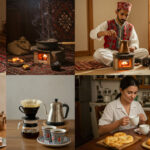












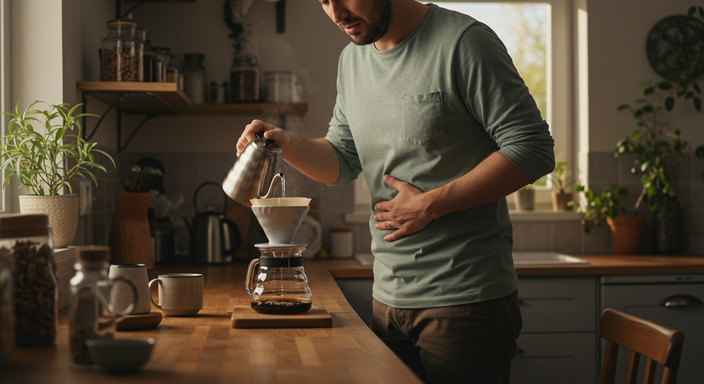
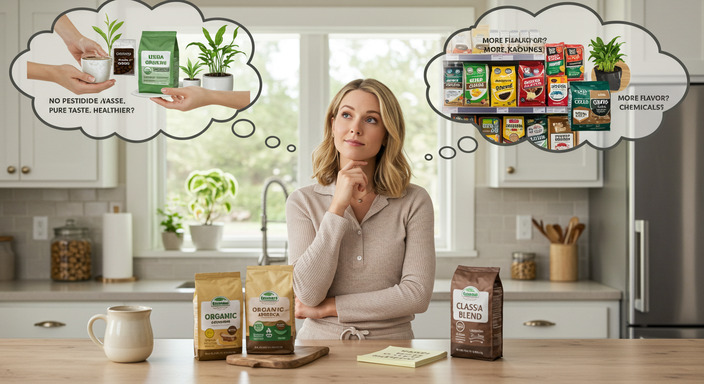
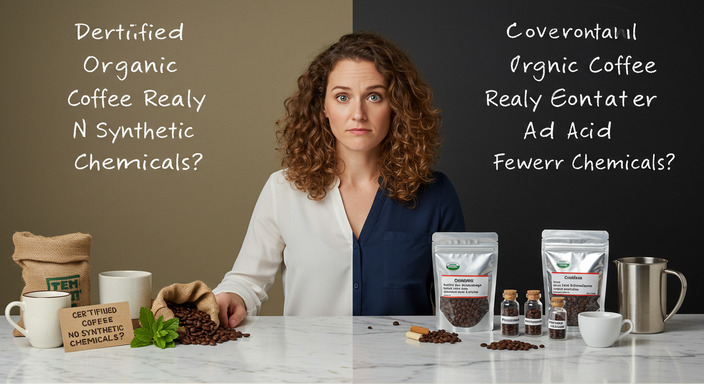
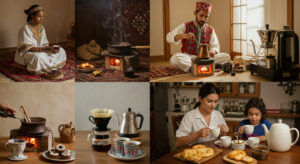






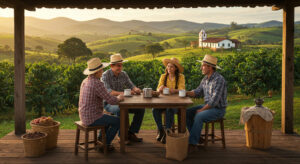


Post Comment